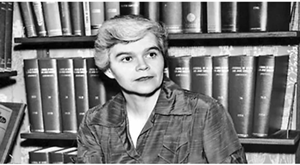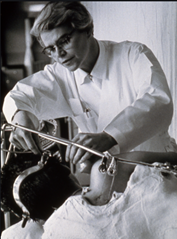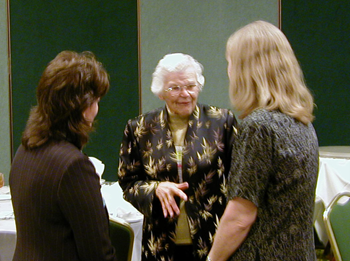News
Women's History Month Highlight: Dr. Jacquelin Perry
The POSNA Diversity Committee would like to honor Dr. Perry's life and career contributions to the practice of pediatric orthopaedics.
“Always ask why” was the mantra Dr. Jacquelin Perry lived by. Intellectual curiosity and dedication guided her groundbreaking contributions, which continue to have enormous impact on the practice of pediatric orthopaedics. Her influence extends into the fields of neuromuscular disorders, gait, spine and rehabilitation. She would say her life benefited from several timely opportunities and she grasped each one. Dr. Perry earned money for college tuition by washing laboratory equipment. She graduated in 1940 from the University of California, Los Angeles with a major in physical education. She grasped an opportunity to obtain a certificate in physical therapy from Walter Reed by joining the army. The military experience took her to Hot Springs, Arkansas where she began developing a strong interest in poliomyelitis. Subsequently, she used the GI Bill to attend medical school at the University of California, San Francisco. One of just 10 women in her 1950 medical school class, she was the only woman to progress to an orthopaedic residency. Not surprisingly, she was the first woman to complete an orthopaedic residency at UCSF. She was one of the first women to become a board-certified orthopaedic surgeon in the United States. From there, Dr. Perry began working at the Rancho Los Amigos polio program. She stayed at the Rancho Los Amigos National Rehabilitation Center for more than 60 years. She taught at the University of Southern California medical school from 1972 well into the 1990s.
She would say her life benefited from several timely opportunities and she grasped each one. Dr. Perry earned money for college tuition by washing laboratory equipment. She graduated in 1940 from the University of California, Los Angeles with a major in physical education. She grasped an opportunity to obtain a certificate in physical therapy from Walter Reed by joining the army. The military experience took her to Hot Springs, Arkansas where she began developing a strong interest in poliomyelitis. Subsequently, she used the GI Bill to attend medical school at the University of California, San Francisco. One of just 10 women in her 1950 medical school class, she was the only woman to progress to an orthopaedic residency. Not surprisingly, she was the first woman to complete an orthopaedic residency at UCSF. She was one of the first women to become a board-certified orthopaedic surgeon in the United States. From there, Dr. Perry began working at the Rancho Los Amigos polio program. She stayed at the Rancho Los Amigos National Rehabilitation Center for more than 60 years. She taught at the University of Southern California medical school from 1972 well into the 1990s. Much of her life’s work stemmed from her early goal to understand restoration of function in polio survivors. She developed methods to stabilize the cervical spine to allow them to be positioned upright. Pursuant to her mantra of "always ask why" she questioned why polio and later stroke survivors had specific functional deficits. In 1968, she founded the Pathokinesiology Laboratory at Rancho Los Amigos. With her detailed analytic approach, she became a world leader in the biomechanics of human gait and movement. She initially developed a systematic method of visually analyzing gait deviations to guide treatment but she also contributed to development of automated systems. She was a consultant on quantitative gait analysis and on the board of scientific advisors for the Clinical Center of the National Institutes of Health, Her contributions aided in developing the first automated motion capture system in a department of rehabilitation medicine in the US. Among her many ground breaking contributions was her textbook: Gait Analysis: Normal and Pathological Function. The first edition was published in 1992, and the second in 2010. This textbook is still a standard for those seeking to understand gait.
Much of her life’s work stemmed from her early goal to understand restoration of function in polio survivors. She developed methods to stabilize the cervical spine to allow them to be positioned upright. Pursuant to her mantra of "always ask why" she questioned why polio and later stroke survivors had specific functional deficits. In 1968, she founded the Pathokinesiology Laboratory at Rancho Los Amigos. With her detailed analytic approach, she became a world leader in the biomechanics of human gait and movement. She initially developed a systematic method of visually analyzing gait deviations to guide treatment but she also contributed to development of automated systems. She was a consultant on quantitative gait analysis and on the board of scientific advisors for the Clinical Center of the National Institutes of Health, Her contributions aided in developing the first automated motion capture system in a department of rehabilitation medicine in the US. Among her many ground breaking contributions was her textbook: Gait Analysis: Normal and Pathological Function. The first edition was published in 1992, and the second in 2010. This textbook is still a standard for those seeking to understand gait.Multiple awards and honors attest to her lifetime of work. In 1996, the Jacquelin Perry Neuro-Trauma Institute and Rehabilitation Center at Rancho Los Amigos National Rehabilitation Center was dedicated. She was awarded the Kappa Delta Award by the Orthopaedic Research Society, the UCLA Professional Achievement Award, the State of California Physician of the Year, and the Gait and Clinical Movement Society the Lifetime Achievement Award. The American Orthopaedic Association recently named her a “Pillar of Orthopaedics”.
 Dr. Perry’s legacy includes students of orthopaedics, physical therapy, and rehabilitation. She was called the "Grand Dame of Orthopaedics". The Perry Initiative was founded in 2009 in her honor. This program reaches out to young women in high school, college and medical school to encourage women to pursue careers in orthopaedics and engineering. More than 11,000 young women have participated. Longitudinal data has shown that higher percentage of participants are studying science, technology, engineering, and math subjects.
Dr. Perry’s legacy includes students of orthopaedics, physical therapy, and rehabilitation. She was called the "Grand Dame of Orthopaedics". The Perry Initiative was founded in 2009 in her honor. This program reaches out to young women in high school, college and medical school to encourage women to pursue careers in orthopaedics and engineering. More than 11,000 young women have participated. Longitudinal data has shown that higher percentage of participants are studying science, technology, engineering, and math subjects.Dr. Perry passed away in 2013. Her influence was felt in the founding of the Scoliosis Research Society in 1966 and the Ruth Jackson Orthopaedic Society in 1983. Despite being past her 90th birthday, she was a regular at both of these meetings. She would inevitably be surrounded by mentees and colleagues and remind us to “Always ask why.”
https://perryinitiative.org/
https://www.aoassn.org/
In Memoriam: A Tribute to Jacqueline Perry
Archives of Physical Medicine and Rehabilitation, 2013-10-01, Volume 94, Issue 10, Pages 2036.e1-2036.e4, Copyright © 2013 American Congress of Rehabilitation MedicineGiants In Orthopaedic Surgery: Jacquelin Perry MD, DSc (Hon)
Festino, Jennifer MA, ELS1,aClinical Orthopaedics and Related Research: March 2014 - Volume 472 - Issue 3 - p 796-801
doi: 10.1007/s11999-013-3457-x
